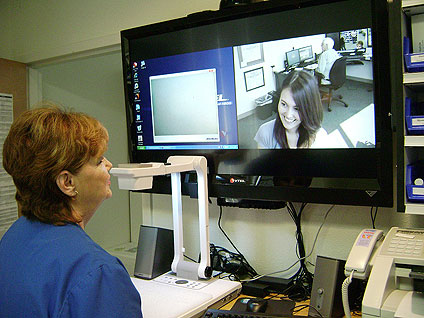 There are lots of useful technologies out there for pharmacies, but I see precious few being put to good use. Why? Oh, who the heck knows. It’s a mystery to me. People whine all the time about how bad pharmacy operations are, but they never do anything to fix it. Human nature I suppose. If I were a DOP or CPO I’d be using anything and everything I could get my hands on to improve operations and make life easier for my pharmacists, and in turn easier for “pharmacy” and nursing, which in theory leads to better patient care. It’s the great circle of life. Sort of.
There are lots of useful technologies out there for pharmacies, but I see precious few being put to good use. Why? Oh, who the heck knows. It’s a mystery to me. People whine all the time about how bad pharmacy operations are, but they never do anything to fix it. Human nature I suppose. If I were a DOP or CPO I’d be using anything and everything I could get my hands on to improve operations and make life easier for my pharmacists, and in turn easier for “pharmacy” and nursing, which in theory leads to better patient care. It’s the great circle of life. Sort of.
Here are four things I think every hospital pharmacy should be using, in no particular order:
- Telepharmacy – Why, oh why isn’t everyone using telepresence technology to improve operations and clinical activities in the pharmacy? From remote checking in the IV room to remote consultation where specialized pharmacy knowledge is needed, but no pharmacist is available. It only makes sense if you want to get pharmacists more involved in patient care. The only company I know of that specializes in this area of pharmacy is Envision Telepharmacy. I’ve had a couple of great conversations with their CEO. She gets it.
- IV room workflow management technology – There’s really no excuse for not utilizing some type of workflow management solution in the IV room. The time has come. The IV room is the most dangerous room in the house and it’s also the most overlooked. What the heck is up with that? I’ve been harping on this for a while. Nobody listens though. Some of the players in this area include:
- DoseEdge by Baxa
- Pharm-Q In The Hood (ITH) System by Envision Telepharmacy
- ScriptPro SP Central Telepharmacy System
- Phocus Rx
- RFID med tray tracking – Let’s see, hands-free scanning with potential for real-time information and tons of embedded data. What’s not to like about that? You got me. It’s a no-brainer, but for whatever reason RFID is as popular in pharmacy as a turd in the punch bowl at a party.

From RFID Journal: “The pharmacy department of the University of Maryland Medical Center (UMMC), a 750-bed hospital located in Baltimore, is employing an RFID-based solution to aid in the stocking of medication kits transported around the hospital for use with patients in the event of emergencies. Thanks to the technology, provided by RFID startup firm Kit Check, the hospital knows what was loaded onto each tray to form a crash-cart kit, as well as which medications were used and which are approaching their expiration dates. In addition, the facility has reduced the amount of time employees must spend loading each emergency medication tray, from approximately 20 minutes down to less than 5 minutes. “
Huh, imagine that. Why would anyone want real-time access to information like that? And who in their right mind would want to cut down on time required to fill a med tray? [sarcasm…in case there was any doubt]
-  “Real-time†medication tracking – I remember working in the inpatient pharmacy when I was still a real pharmacist. Missing medications drove me crazy. It’s kind of like losing socks in the wash. Where the heck do they go? I don’t know, but I always seem to come up one short, and it’s always one of my “good socks”. It’s never one of those crappy dudes I wear around the house when it’s cold outside. Sorry, I digress. Of course the problem with missing meds is worse when you have a cart-fill model, but it’s ever present no matter what you’re dispensing from the pharmacy. IV’s can be a big a headache as they always seem to be “STAT” and can be costly. Real-time tracking keeps people on task by preventing a lot of those missing med calls, and it reduces a lot of waste. A couple of players that come to mind for medication tracking include:
- MedBoard by Pharmacy OneSource
- PharmTrac.PD by PlusDelta Technologies – I saw this at the ASHP Summer Meeting 2011 in Denver. It’s some pretty cool stuff.
That’s it, four things that could make your life a whole lot easier. Of course, that’s assuming you want things to be easier. Based on what I’ve seen in pharmacies across the country we like things complicated, outdated, and slow. Just sayin’.


Leave a Reply